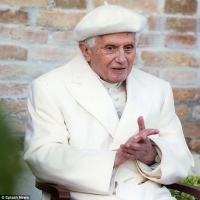At first glance, the meaning of this dogma seems clear. However, Father Feeney was condemned by the Holy Office in 1949 for taking an extremist position on extra ecclesiam nulla salus.
Lionel: He refused to say there was known salvation outside the Church.
___________________
He ignored, rejected, or distorted subsequent teaching on invincible ignorance and how baptism of desire can, in some providential way, join people to the Church (see my other recent comments for more details).
Lionel: He refused to that invincible ignorance or baptism of desire referred to known cases. He could not say invisible cases were visible.This is common sense.
____________________
It's worth recalling that the Council of Florence was an attempt to heal a schism, so it emphasized the danger of not submitting to Rome: even martyrdom would not suffice to save someone who, "knowing that the Catholic Church was made necessary by Christ, would refuse to enter or to remain in it" (Lumen Gentium 14). The Council of Florence took place before the discovery of the Americas, and was not primarily concerned with those who had never heard the Gospel.
Lionel: At the time of the Council of Florence they obviously knew there were no known exceptions to the dogma outside the Church there is no salvation.The dogma had already been defined by two Church Councils.
There being known salvation is central to the Rahner-Ratzinger new theology.
_________________
As St. Pius X taught, we must not abandon the sense of the dogma in Cantate Domino. But the dogma can be said to have evolved with Bl. Pius IX's Quanto Conficiamur Moerore and Pius XII's Mystici Corporis Christi, because, without abandoning the original sense (since being joined to the Church is still required for salvation), it expanded our understanding of how one can be joined to the church.
Lionel: Quanto Conficiamur Moerore and Mystici Corporis does not state that there are known exceptions to the dogma extra ecclesiam nulla salus.A reader has to assume that the baptism of desire and being saved in invincible ignorance refers to explicit cases, personally known cases. Then he has to infer that these 'explicit' cases are relevant and exceptions to the dogma extra ecclesiam nulla salus.
____________________
As the Catechism of St. Pius X says (article 9, question 29):
Q. But if a man through no fault of his own is outside the Church, can he be saved?
A. If he is outside the Church through no fault of his, that is, if he is in good faith, and if he has received Baptism, or at least has the implicit desire of Baptism; and if, moreover, he sincerely seeks the truth and does God's will as best he can; such a man is indeed separated from the body of the Church, but is united to the soul of the Church and consequently is on the way of salvation
Lionel: He is referring to a speculative case. If in the mind of Pius X this is an explicit case, then it would mean the pope made an objective error. He has confused what is invisible as being visible.
This confusion is central to the Rahner-Ratzinger new theology.It is based on this irrationality that Pope Benedict says there is a development of doctrine.For him LG 16 would refer to an explicit case.So only then would Vatican Council II contradict the dogma extra ecclesiam nulla salus according to the Council of Florence.
_______________________
This is the sort of legitimate development or evolution of dogma that fits the description in Dei Verbum 8:
"This tradition which comes from the Apostles develop in the Church with the help of the Holy Spirit. For there is a growth in the understanding of the realities and the words which have been handed down. This happens through the contemplation and study made by believers, who treasure these things in their hearts (see Luke, 2:19, 51) through a penetrating understanding of the spiritual realities which they experience, and through the preaching of those who have received through Episcopal succession the sure gift of truth."
I think this is what Benedict means when he speaks of an evolution of dogma.
Lionel: For Pope Benedict there has been a development to the extent that the dogma does not exist any more.If there are known exceptions, then it means the dogmatic teaching does not apply any more. They made a mistake over the centuries.There is no infallibility of the pope ex cathedra.
-Lionel Andrades
http://remnantnewspaper.com/web/index.php/articles/item/2374-benedict-breaks-his-silence-with-another-leaky-lifeboat







